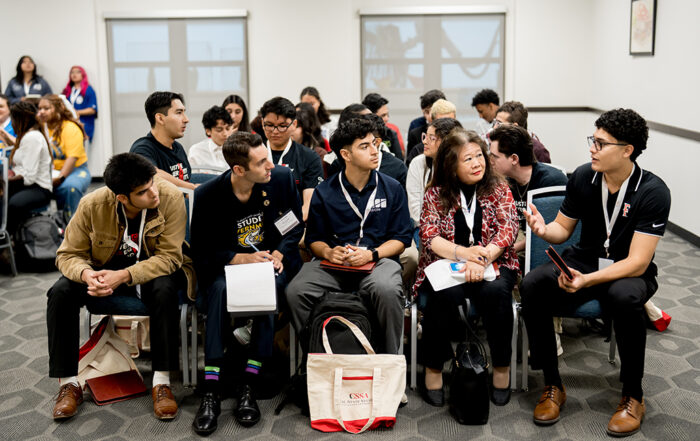
2023 Policy Agenda
December 22, 2022
Priority 1
Address the Total Cost of Attendance for CSU Students
California public higher education tuition is at an all-time high and at least half of students in these systems do not pay tuition costs due to aid programs. However, it is evident that non-tuition costs have become the major barrier for students as the cost for housing, transportation, and other academic costs have increased 24 percent since 2012. To ensure system-wide affordability for students there must be an emphasis from the system, state, and federal government to invest and create policies that improve upon the financial burdens that students face.
Since 2020, students’ concern regarding access to food, affordable housing and technology has sharply increased. Housing insecurity and homelessness is more prevalent at four-year institutions and disproportionately affects students from vulnerable communities. Programs at the state and federal level such as CalFresh (federally SNAP) are important safety nets to aid students in times of need and it is important that campuses can support students in navigating these types of programs.
Technology and reliable broadband are also critical for students to have access to a quality education. The digital divide has impacted more students than ever but is most prevalent in communities of color and lower income households. It is imperative that students are provided access to affordable and reliable technology and that the state of California improves broadband capabilities throughout the state.
Priority 2
Ensure students have access to high quality wellness and mental health support services
Students’ concern about their personal well-being has drastically increased5 since the beginning of the pandemic in early 2020. However, students at the CSU seeking mental health services struggle to find appointments on their campus. To address the lack of resources and availability, the system will need to new ways to provide services like counseling, and it is important that new modalities of service are assessed and integrated to provide more options for the diverse needs of CSU students.
Student health services and programs are essential to student success and to the health of the campus community. In a diverse institution like the CSU, students have unique needs and access to resources that improve their experience on campus and contribute to their sense of belonging. It is important to assess student needs and provide resources for all student populations.
Priority 3
Ensure the academic success and holistic educational experience of all CSU students
The pandemic continued to show that students from vulnerable communities are not receiving equitable resources that are readily available to their peers, like access to state and federal food programs, housing programs, and expanded financial aid. However, as important as basic needs is the sense of belonging. A student’s sense of belonging contributes to their academic achievement. Creating a community of inclusion and belonging is particularly important for our most
marginalized communities to excel in their overall curricular and co-curricular activities.
Goal 2 | Ensure students have the ability to thrive academically in safe and supportive environments
The physical safety of all members of campus communities is imperative to student success and well-being. It will take all members of the community to work together to improve the policies, procedures, and structures that contribute to safety. It is imperative that students are involved in the creation of policies, practices, and advisory committees for providing safety and evaluating the effectiveness of programs on campuses and at the system-wide level.
Priority 4
Ensure students are regarded as equal stakeholders within the CSU
community
Students are experts in the day to day student experience across our campuses. As such, it is imperative that students be engaged in decision making processes that will have an impact on their pursuit of a CSU degree. The lack of engagement negatively affects the investment of students in their pursuit of education and often leads to low retention, a loss of a sense of belonging and a less diverse campus community.To ensure all students have an equal opportunity to the
harbess the transformative power of a CSU degree, the CSU should take better engage students as stakeholders in future policy decisions.



